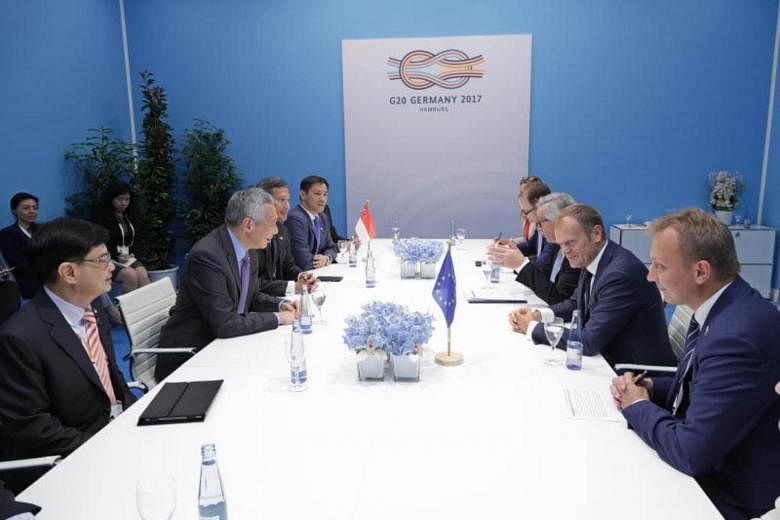HAMBURG - Countries need to have the right mindset towards technological advancements and be ready to embrace changes, to help their people realise the full benefits of digitalisation, said Prime Minister Lee Hsien Loong.
Speaking at the Group of 20 (G-20) Summit on Saturday (July 8), he outlined the ways governments can help workers and businesses affected by the onset of digitalisation and new technologies.
"Ultimately, whether it works or not, it boils down to a question of mindset," he said to leaders of the world's major economies. "Are we optimistic or pessimistic about the future? Are we confident in our ability to deal with major change? Do we believe human ingenuity and creativity will improve our lives, or do we fear that it will cause us more problems?"
The Prime Minister delivered his remarks at a working lunch on digitalisation, women's empowerment and employment.
Mr Lee noted that the integration of digital technologies into jobs and everyday life has brought great hope and also great fear.
On the one hand, many people are excited about developments such as industry 4.0, the internet of things, personalised medicine, artificial intelligence and deep learning.
"These buzzwords have generated entrepreneurial energy and exuberance, and conjured up a brave new world where anything is possible," he said.
But on the other hand, digitalisation has also brought about great fear, he said, with blue-collar workers and professionals worried that they will lose their jobs as a result of technological advancements.
But in reality, this fear is not as grave as imagined, he added noting that long-term unemployment rates "have in fact not gone up very much".
In order for the hope to materialise, he said, deep transformation is needed.
Companies and industries need to change the way they do business and adopt new technologies, while workers have to change their mindsets and learn new skills.
This is where governments can play an active role in supporting industries and businesses in their transformation, Mr Lee said.
They can provide the right environment, institutions and design programmes to help companies enter new markets, as well as develop and adopt new technologies.
Governments have to also set the right frameworks and rules to promote innovation, and prevent established ways of doing things from holding back progress, he said.
Mr Lee cited the sharing economy, from sharing car rides to rooms, bicycles, and umbrellas, that has caused disruption to traditional industries.
"We can ban them...but if it does work, that would deprive our peoples of the benefits these new schemes offer. We cannot always let them run unregulated either, because there was often good reason to regulate their traditional equivalents," he said.
New ideas and players must be allowed to emerge, while incumbent players still get a fair chance to adapt and compete, he noted.
Governments must also train and equip workers with the skills and confidence to thrive in the new world, said Mr Lee.
Countries such as France, the UK and South Korea have rolled out basic coding and robotics programs for schoolchildren, and Singapore has done the same.
So while Singapore is nowhere close to making it into the last 16 for the football World Cup, "Singaporean school teams compete in the Robot Soccer World Cup, and regularly emerge champions," he quipped.
Mr Lee also highlighted the SkillsFuture programme, which promotes lifelong learning among workers.
On top of training workers, governments also need to help workers at risk of being displaced to adapt to the changing job market, Mr Lee added.
He pointed to schemes such like the Adapt and Grow programme, to train displace workers, matchmake them to new jobs, and subsidise their wages as they make the transition.
He cited clean room workers displaced from electronics plants, who received help to move to the medical devices industry. These workers learned to do micro-stitching to make artificial heart valves, he said.
Summing up, Mr Lee said: "When it comes to digitalisation and jobs, we must not yield to our fears and anxieties. It is wiser for us to be optimistic and work hard to make our hopes come true."


